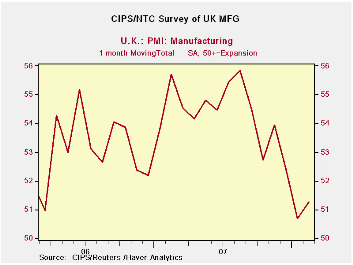 Global| Mar 03 2008
Global| Mar 03 2008UK MFG Sector Makes a Small Bounce
Summary
The UK MFG sector rebounded slightly in February although it remains a weak reading for the sector at 52.26. Readings above 50 indicated expansion on this measure. The MFG measure stands in the 61st percentile of its range, a [...]

The UK MFG sector rebounded slightly in February although it remains a weak reading for the sector at 52.26. Readings above 50 indicated expansion on this measure. The MFG measure stands in the 61st percentile of its range, a moderately expansionary reading. Construction and services sector are still relatively weaker in their respective ranges but are as yet only available through January, not February.
| MFG, Construction and Services PMI CIPS/NTC | ||||||
|---|---|---|---|---|---|---|
| Monthly readings | Change over: | percentile | ||||
| Feb-08 | Jan-08 | 3MO | 6MO | 12MO | of range | |
| MFG | 51.26 | 50.69 | -2.02 | -4.75 | -3.09 | 61.8 |
| Construction | #N/A | 53.87 | -3.54 | -7.95 | -4.03 | 34.3 |
| Services* | #N/A | 52.46 | -0.62 | -4.56 | -6.76 | 35.8 |
| MFG range since January 1992; Construction Since April 1997 Services Since July 1995. | ||||||
| *Services & construction changes and ranking: Jan-08 which is the most current date. | ||||||
Robert Brusca
AuthorMore in Author Profile »Robert A. Brusca is Chief Economist of Fact and Opinion Economics, a consulting firm he founded in Manhattan. He has been an economist on Wall Street for over 25 years. He has visited central banking and large institutional clients in over 30 countries in his career as an economist. Mr. Brusca was a Divisional Research Chief at the Federal Reserve Bank of NY (Chief of the International Financial markets Division), a Fed Watcher at Irving Trust and Chief Economist at Nikko Securities International. He is widely quoted and appears in various media. Mr. Brusca holds an MA and Ph.D. in economics from Michigan State University and a BA in Economics from the University of Michigan. His research pursues his strong interests in non aligned policy economics as well as international economics. FAO Economics’ research targets investors to assist them in making better investment decisions in stocks, bonds and in a variety of international assets. The company does not manage money and has no conflicts in giving economic advice.
More Economy in Brief
 Global| Feb 05 2026
Global| Feb 05 2026Charts of the Week: Balanced Policy, Resilient Data and AI Narratives
by:Andrew Cates






